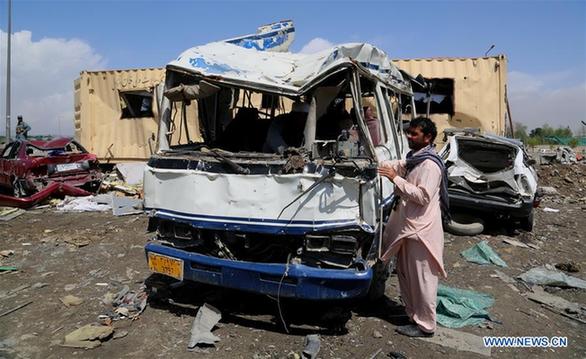Afghan peace on the agenda
- By Sajjad Malik
 0 Comment(s)
0 Comment(s) Print
Print E-mail China.org.cn, June 7, 2017
E-mail China.org.cn, June 7, 2017
|
|
|
A man checks the debris of his bus at the site of a truck bombing attack in Kabul, Afghanistan, April 21, 2016. The truck bombing near the Afghan Presidential Palace and Defense Ministry building on Tuesday destroyed dozens of civilian houses and affected a lot of people's lives. It also destroyed 54 vehicles parked near the scene of the blast. [Xinhua file photo] |
The fact that the meeting was organized according to the schedule shows that Afghanistan and the world community are keen for peace.
Ghani made an impassioned plea to the Taliban to shun senseless violence and join the peace process for a stable and prosperous national future. He also offered to allow them to open a political office in Kabul to pave way for a peace dialogue. According to Ghani, it could be the last chance for the group to become part of the political process.
There was no response from the rebels; however, a rocket was fired that landed in the diplomatic residential area of Kabul, fortunately causing no casualties.
Ghani, in his speech, also targeted Pakistan for allegedly sheltering Taliban and Haqqani network militants whom Afghan leaders have blamed for the lethal Kabul bombing. However, he also hoped to “convince” Pakistan that a peaceful Afghanistan was in its interests.
There is no gainsaying that the Afghan issue is complex. Part of this is due to the attitude of various parties and stakeholders towards the question of peace. For example, the Afghan leadership is convinced that Pakistan holds the key and it can deliver peace within days by forcing the Taliban to negotiate.
The ground situation hardly supports this stance. Taliban controls nearly a third of country and are more powerful than ever since they were ousted in 2001. Their dependence on Pakistan has decreased considerably, as they have also cultivated ties with other players like Iran and Russia and have gained some vital international credibility.
To expect that Pakistan can force the Taliban to join the peace process is, in fact, asking far too much. Pakistan’s advisor on foreign affairs Sartaj Aziz has made it clear on a number of occasions that Islamabad has limited leverage to coerce militants. It can urge them, but it cannot dictate to them.
Pakistan also says that certain elements within Afghanistan are against peace and, instead of correcting the domestic situation, they conveniently shift the burden on Pakistan. According to Aziz, the same elements blamed Pakistan for the Kabul attack within hours without any probe.
Afghan leaders have failed to move the Taliban as they have been suing for peace from the position of weakness. Why should the Taliban or any other group join any peace talks when the momentum of the fighting is with them? Afghan forces are capable and have shown a lot of resilience, but they cannot defeat the Taliban in guerilla warfare.
It means that there is an element of stalemate because the Taliban cannot conquer Kabul while Afghan forces cannot go after them in the wild countryside where they rule unchallenged. Indeed, the Taliban have gained the upper hand due to their monopoly over violence.
That could be the reason for the demand to increase U.S. troops in-country. Already, America has about 8,400 troops while NATO has stationed about 5,000 soldiers. Additional troops with the express mandate to carry out combat missions may help to break the current impasse.
Changing the momentum of the fighting may reduce pressure on Afghanistan security forces but it is not certain the Taliban would join the peace talks or their desire for peace would improve the security situation. Let us also remember that Islamic State is active in the border regions of Afghanistan and it would be beneficiary if Taliban were defeated or weakened.
Afghanistan should also review its foreign policy and its attitude towards Pakistan with which it shares a 2400 km-long border. The presence of India in Afghanistan is source of concern for Pakistan. Its security agencies are convinced that India is using Afghan involvement to destabilize it. A number of terrorist attacks in Pakistan were traced back to Afghanistan.
The Afghan leaders should also deliver on the domestic front. They have failed to address the issue of governance, which means improving economy, ending corruption and addressing the problems faced by the common people.
Hence, Afghanistan should not just take back the initiative from the Taliban. Its leaders should take moral responsibility to give a better future to the people.
Sajjad Malik is a columnist with China.org.cn. For more information please visit:
http://www.china.org.cn/opinion/SajjadMalik.htm
Opinion articles reflect the views of their authors, not necessarily those of China.org.cn.







Go to Forum >>0 Comment(s)